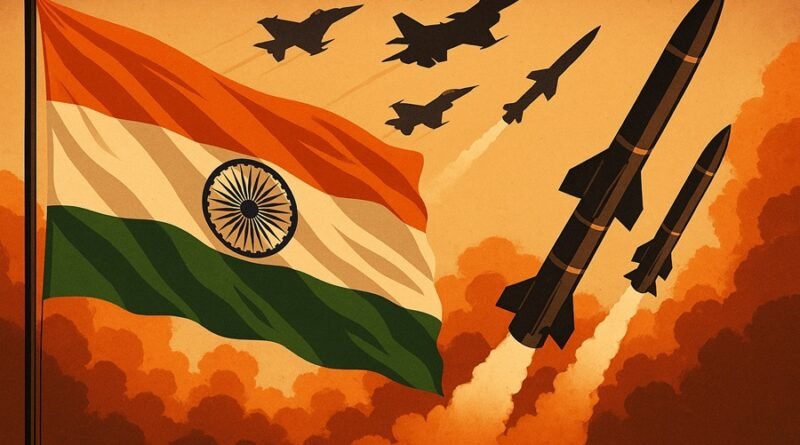Operation Sindoor and India’s New Counter-Terrorism Doctrine: A Decisive Strategic Shift
In a landmark national address that could redefine South Asia’s security dynamics, Prime Minister Narendra Modi on Monday declared a transformative change in India’s counter-terrorism posture. Marking the successful conclusion of Operation Sindoor, the Prime Minister warned adversaries that “Operation Sindoor is now India’s established policy in the fight against terrorism.”
Describing the operation as a paradigm shift in India’s security doctrine, PM Modi said that India will no longer remain passive in the face of terrorism, nor will it be restrained by traditional geopolitical hesitations. The military operation, launched in response to the April 22 Pahalgam terror attack, resulted in precision strikes deep inside Pakistan and Pakistan-Occupied Kashmir (PoK), dismantling terrorist infrastructure and sending a loud signal to those who sponsor cross-border terrorism.
Read This: PM Modi Declares Nuclear Blackmail Will Not Be Tolerated by India!
Operation Sindoor: A Turning Point in India’s National Security Strategy
What Was Operation Sindoor?
Operation Sindoor was a multi-pronged retaliatory strike carried out by the Indian Armed Forces against terror camps and logistical hubs located across the LoC and deep inside PoK. According to official sources, the operation was conducted with pinpoint intelligence, aided by India’s air defense systems, electronic warfare units, and special operations forces.
The strikes were swift, surgical, and highly targeted, causing severe damage to Pakistan’s terror support infrastructure. Indian forces used precision-guided munitions, including SCALP and HAMMER missiles, launched from Rafale jets, showcasing India’s growing strategic reach and firepower.
PM Modi’s Doctrine: The Three Pillars of India’s New Security Policy
In a carefully worded yet forceful message, PM Modi outlined three foundational pillars that now define India’s new approach toward terrorism:
1. Decisive Retaliation
India will no longer absorb terror attacks silently. Any aggression on Indian soil will be met with swift and resolute retaliation, hitting terrorist networks at their source and support systems. The Prime Minister emphasized that India reserves the right to choose the time, place, and method of response, reflecting a doctrine of strategic autonomy and unpredictable precision.
“Retaliation will no longer be symbolic. It will be transformational,” said PM Modi.
2. No Tolerance for Nuclear Blackmail
For decades, Pakistan’s nuclear capability has been used as a shield for terrorist activity, creating strategic paralysis in India’s response matrix. That policy, PM Modi declared, is no longer valid.
India will not be deterred by nuclear rhetoric or threats. The surgical precision of Operation Sindoor has proven that India can act decisively without crossing the nuclear threshold, and without falling prey to psychological deterrence.
3. No Distinction Between Terrorists and Their Sponsors
Perhaps the most profound shift in doctrine is the collapse of the firewall between state and non-state actors. India will now treat governments that host, support, or protect terrorist groups as active collaborators in terrorism.
This is a game-changing stance in international relations, signaling to global powers that India will hold sovereign states accountable for terrorism launched from their soil, regardless of plausible deniability.
‘Pakistan Was Left Begging for Peace’
In a powerful segment of his address, PM Modi praised the bravery and precision of the Indian Armed Forces, stating that the enemy’s war infrastructure was shattered, leaving Islamabad politically and militarily stunned.
“Pakistan was forced to seek an escape route. It found itself begging for peace after suffering heavy losses,” PM Modi said.
According to defense sources, multiple high-value terror camps were neutralized, ammunition depots were destroyed, and communication channels between terror groups were severed. The strikes reportedly caused panic and disarray within Pakistan’s military ranks.
Pakistan’s Strategic Silence and Global Reactions
In the wake of Operation Sindoor, Pakistan’s official response was muted and vague, reflecting the shock and damage sustained. Unlike previous provocations where Pakistan would escalate rhetoric, this time Islamabad reached out discreetly to New Delhi, signaling a desire to de-escalate.
International observers noted a notable absence of global condemnation toward India’s actions. Instead, key global powers such as France, Israel, and the United States reiterated India’s right to self-defense and urged Pakistan to dismantle terrorist networks operating from its territory.
Geopolitical Significance: India’s Evolving Defense Posture
Operation Sindoor is more than a tactical victory—it is a geostrategic assertion of India’s emergence as a proactive security power. With this operation, India has:
- Demonstrated conventional superiority backed by 4.5th-generation platforms like the Rafale and BarhMos Missile.
- Proven the effectiveness of indigenous systems such as Akash missile batteries and Akashteer command networks in real combat integration.
- Enhanced its deterrence posture without breaching international norms or escalating into full-scale war.
A Message to the World: India Will Define the New Normal
In PM Modi’s words, “Operation Sindoor has redefined the fight against terror … setting a new standard and a new normal in counter-terrorism measures.”
This declaration is a signal not only to Pakistan but also to the global diplomatic community that India’s era of strategic patience is over. The nation now embraces strategic assertiveness as a new hallmark of its national defense philosophy.
Conclusion
The success of Operation Sindoor and the unveiling of a bold new counter-terror doctrine mark a historic shift in India’s defense paradigm. No longer reactive or restrained, India is now assertively reshaping the rules of engagement in a region long plagued by cross-border terrorism and proxy warfare.
With this transformation, India has drawn clear red lines, clarified its doctrine, and put adversaries on notice—that any act of terrorism will be met with uncompromising and precise retaliation.
In a rapidly changing global order, India’s message is clear: “We will not tolerate terror. We will not be blackmailed. And we will not differentiate between the hand that holds the gun and the one that funds it.”

